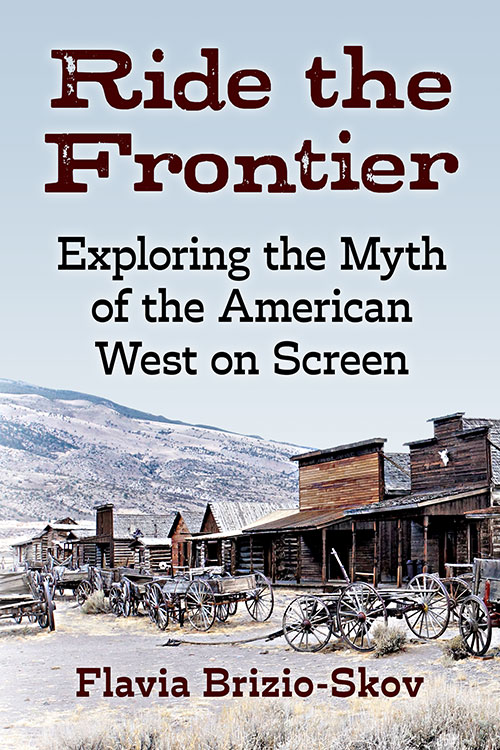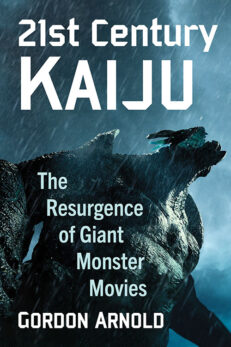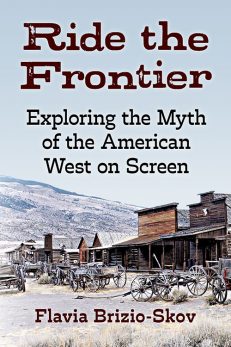Ride the Frontier
Exploring the Myth of the American West on Screen
$45.00
In stock
About the Book
With fresh appraisals of popular Westerns, this book examines the history of the genre with a focus on definitional aspects of canon, adaptation and hybridity. The author covers a range of largely unexplored topics, including the role of “heroines” in a (supposedly) male-oriented system of film production, the function of the celluloid Indians, the transcultural and transnational history of the first spaghetti Western, the construction of femininity and masculinity in the hybrid Westerns of the 1950s, and the new paths of the Western in the 21st century.
About the Author(s)
Bibliographic Details
Flavia Brizio-Skov
Format: softcover (6 x 9)
Pages: 252
Bibliographic Info: 24 photos, notes, bibliography
Copyright Date: 2021
pISBN: 978-1-4766-8306-5
eISBN: 978-1-4766-4191-1
Imprint: McFarland
Table of Contents
Acknowledgments ix
Introduction: Why the Western? 1
1. Transnational Adaptation, Transculturation and Indigenization:
Dashiell Hammett’s Red Harvest, Carlo Goldoni’s The Servant of Two Masters, Akira Kurosawa’s Yojimbo and Sergio Leone’s A Fistful of Dollars 13
Prologue 13
The National 16
The Origins: Local and Translocal 22
The Transnational 26
Conclusion 42
2. Celluloid Indians, 1950s Westerns and the Termination Act:
Broken Arrow, White Feather, The Battle of Apache Pass, Devil’s Doorway, The Last Wagon and The Last Hunt 45
Prologue 45
Broken Arrow (1950) 52
White Feather (1955) and The Battle of Apache Pass (1952) 57
Devil’s Doorway (1950) 59
The Last Wagon (1956) 67
The Last Hunt (1956) 74
Conclusion 79
3. Heroines in Western Films?
Mikhail Bakhtin’s “Dialogic Imagination” in Shane, High Noon and Westward the Women 84
Monoglossia: The Submissive Woman and Shane (1953) 89
Heteroglossia: The Transgressive Woman and High Noon (1952) 93
X-glossia: Transformational Women and Westward the Women (1951) 100
4. Hybridity and (De)Construction of Femininity and Masculinity in Rancho Notorious, Johnny Guitar and Duel in the Sun 109
Rancho Notorious: The Filmic Text (1952) 111
Johnny Guitar: Paratext 121
Johnny Guitar: Peritext and the Novel (1953) 123
Johnny Guitar: The Filmic Text (1954) 127
Duel in the Sun (1946): Paratext 136
Duel in the Sun: The Novel (1944) 139
Duel in the Sun: The Filmic Text (1946) 141
Patriarchy and Failed Masculinities 143
Patriarchy and Failed Femininities 146
Capitalism and Patriotism 149
5. New Paths of the Western in the Third Millennium:
The Lone Ranger, Yesterday and Today 152
The Western Genre Today 152
Enter The Lone Ranger: Prologue 155
The Lone Ranger Yesterday or How the West Was Conquered 156
The Lone Ranger (2013): Paratext 161
The Lone Ranger Today or How the West Was Lost 164
Chapter Notes 177
Bibliography 225
Index 233
Book Reviews & Awards
• “Scholars interested in the Western can learn a great deal from this book, which is intellectually ambitious and generously delivered.”—Italica: Journal of the American Association of Teachers of Italian
• “A motif that emerges throughout Brizio-Skov’s volume and distinguishes it from other works is the analysis of westerns through a cultural studies lens…. Through the author’s analysis of such aspects as the western’s international influences, its empowerment of women and its positive treatment of Native Americans, one is encouraged to see the genre if not in a more positive light, then at least in a more complex way than some critics have previously argued.”—Alphaville: Journal of Film and Screen Media
• “The topic, the theoretical framework, the analytical approach, the breadth of the sources consulted, the range of films discussed, and the critical angles applied in this monograph make it a valuable contribution to scholarship in western film studies.”—Flavia Laviosa, Wellesley College





